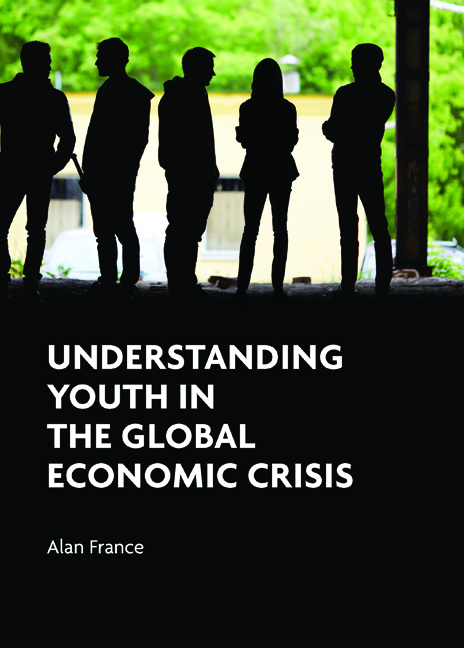Book contents
- Frontmatter
- Dedication
- Contents
- List of tables and figures
- About the author
- Acknowledgements
- Introduction
- One A political ecology of youth
- Two The global crisis and the ‘age of austerity’
- Three Education and training: the broken promise
- Four Education and training: from public good to private responsibility
- Five Unemployment and work: precarious futures
- Six NEETs and the disengaged: the ‘new’ youth problem
- Seven Divergence and difference: contrasting cross-national experiences of being young
- Eight Education, work and welfare in diverse settings
- Nine Youth and mobility: inequality, leaving home and the question of youth migration
- Ten After the crisis: social change and what it means to be young
- References
- Index
Three - Education and training: the broken promise
Published online by Cambridge University Press: 01 September 2022
- Frontmatter
- Dedication
- Contents
- List of tables and figures
- About the author
- Acknowledgements
- Introduction
- One A political ecology of youth
- Two The global crisis and the ‘age of austerity’
- Three Education and training: the broken promise
- Four Education and training: from public good to private responsibility
- Five Unemployment and work: precarious futures
- Six NEETs and the disengaged: the ‘new’ youth problem
- Seven Divergence and difference: contrasting cross-national experiences of being young
- Eight Education, work and welfare in diverse settings
- Nine Youth and mobility: inequality, leaving home and the question of youth migration
- Ten After the crisis: social change and what it means to be young
- References
- Index
Summary
Introduction
Over the last thirty years we have seen more young people worldwide participate in education than ever before. This increase has accelerated in the early 21st century. In 2000 less than one-fifth of those aged 18 to 24 in Organisation for Economic Co-operation and Development (OECD) countries were engaged in some form of post-16 education or training (OECD, 2014a). Between 1999 and 2012, post-16 education and training enrolment among those aged 16 to 25 grew by 45 million to 138 million, with Brazil, China, India, Nigeria, Cuba and South Korea showing the greatest gains. By 2012, across all OECD countries, 82% of 15–19-year-olds and 38% of 20–24-year-olds were participating in some form of full-time education (OECD, 2014a). By 2012, in most industrialised and developed countries, higher education (university-based) enrolments reached approximately half of the age group (18–24-year-olds) with rates exceeding two-thirds in some parts of North America and Western Europe and three-fifths in parts of Oceania (OECD, 2014a).
The post-16 domain in education and training has now become a central field of practice for the young. School-to-work transitions, where the majority of young people left school and went straight into work, have become a distant memory and have been replaced by new transitional arrangements that have strong connections to training and education (Brown et al, 2011; Woodman and Wyn, 2014). Participating in education and training after leaving compulsory schooling has now become more normalised for the young. In fact, as we will see in Chapter Six, some countries are now making it compulsory to be in education or training for those aged 16 to 18. Even in countries where it is not compulsory we also see high levels of engagement for this age group, as they recognise that ‘qualifications’ are essential cultural capital if they are to get work in the future. While those aged over 20 have historically always been less involved in education and training, we have now started to see increased numbers, suggesting they have an extended relationship with education and training that may continue well into their mid 20s. Understanding how the expansion of this subfield of the post-16 experience has taken place and what the key drivers are, is important to our discussion.
- Type
- Chapter
- Information
- Understanding Youth in the Global Economic Crisis , pp. 61 - 86Publisher: Bristol University PressPrint publication year: 2016

